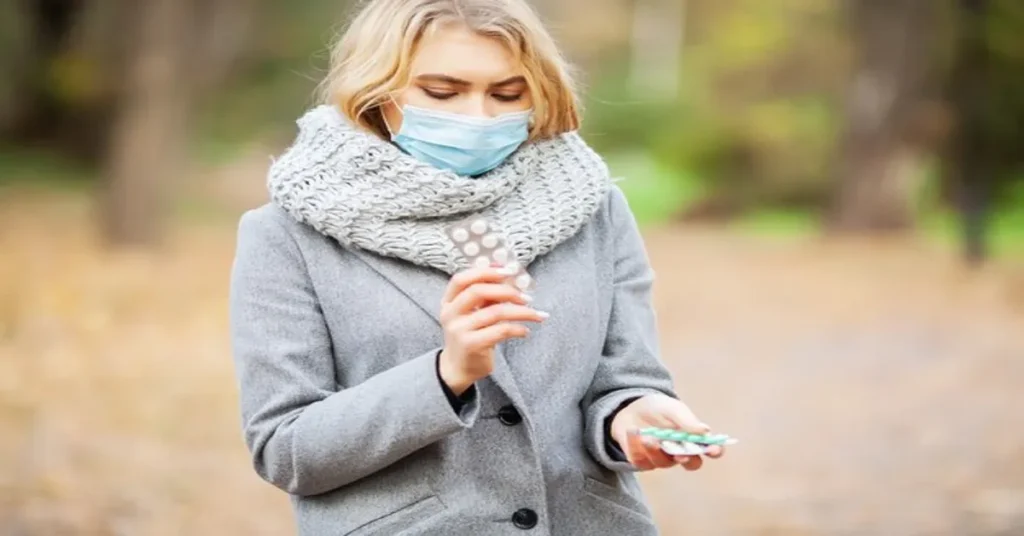As winter settles in across the UK, many of us are bracing for the familiar onslaught of seasonal bugs. Among them is a highly contagious winter bug that’s making headlines this year: norovirus. Often referred to as the “winter vomiting bug,” it can spread rapidly and leave you feeling miserable. Recognizing its symptoms early is crucial for effective management and prevention. In this guide, we’ll delve into everything you need to know about this relentless virus—its signs, how it spreads, treatment options, and tips for keeping yourself and your loved ones safe during these chilly months (Highly Contagious Winter Bug UK). Stay informed and empower yourself against the latest health threats lurking in our communities!
Understanding the Symptoms of the Latest Highly Contagious Winter Bug in the UK
This winter, many are experiencing symptoms linked to the highly contagious norovirus. Typically, it manifests with sudden onset nausea and vomiting. Diarrhea often follows closely behind, making it difficult for those affected to maintain hydration.
In addition to gastrointestinal distress, individuals may experience stomach cramps and general malaise. Some people also report fever or chills as their body fights off the virus. These symptoms can come on quickly and leave you feeling extremely unwell.
It’s important to monitor your health closely if you suspect infection. Knowing these signs can help you take action early and prevent spreading the illness to others in your household or community during this peak season of contagion.
Read: NateSilver Twitter Wisdom: Lessons in Statistics and Prediction
Check if you have norovirus
Norovirus is one of the most common causes of gastroenteritis in the UK, particularly during winter months. If you suspect you might have it, pay attention to sudden nausea and vomiting. These symptoms often appear within 12 to 48 hours after exposure.
Diarrhea usually follows shortly after and may be accompanied by stomach cramps or discomfort. It’s important to monitor these signs closely, as they can escalate quickly.
Fever and body aches are also possible but less frequent. If your symptoms match this description, it’s essential to take precautions to protect yourself and others from spreading the virus further.
How to treat norovirus yourself
If you suspect you’ve caught norovirus, it’s essential to focus on hydration. Drink plenty of fluids like water, clear broths, or oral rehydration solutions. Avoid caffeine and alcohol, as they can worsen dehydration.
Rest is crucial for recovery. Allow your body to recuperate by getting adequate sleep and taking it easy during the day. Listen to your body’s needs and don’t push yourself too hard.
When you feel ready to eat again, start with bland foods such as toast, rice, bananas, or applesauce. These gentle options are less likely to upset your stomach while providing necessary energy for healing.
How norovirus is spread
Norovirus spreads easily, making it one of the most contagious viruses. It can be transmitted through direct contact with an infected person. Sharing food, utensils, or close physical interaction increases your risk significantly.
Contaminated surfaces are another common way to contract norovirus. The virus can survive on hard surfaces for several days. Touching these surfaces and then your mouth or face allows the virus to enter your system.
Improperly handled food is also a significant source of infection. If someone who has norovirus prepares food without proper hygiene practices, they may inadvertently spread the virus to others consuming that food. Maintaining cleanliness in kitchens is essential during winter months when this bug thrives.
Urgent advice: Get advice from 111 now if
If you experience severe symptoms or feel extremely unwell, it’s crucial to seek help. Contact the NHS helpline at 111 for immediate advice. They can provide guidance tailored to your situation.
You should reach out if you or a loved one have persistent vomiting that lasts more than two days. Dehydration is a significant risk with norovirus, and signs like dizziness, dry mouth, or decreased urination warrant urgent attention.
Additionally, if someone in your household has underlying health conditions such as diabetes or heart issues and shows symptoms of this highly contagious winter bug in the UK, getting professional support is essential for their safety.
Immediate action required: Call 999 or go to A&E if you or your child
If you or your child are experiencing severe symptoms, it’s crucial to seek immediate medical attention. Symptoms such as extreme dehydration, persistent vomiting, or a high fever warrant urgent care.
Do not hesitate to call 999 or head straight to A&E in these situations. Rapid response is vital for ensuring proper treatment and preventing further complications.
Additionally, if there are signs of confusion or unresponsiveness in children, immediate action is necessary. These could indicate more serious underlying issues that require professional assessment without delay. Always prioritize safety when health concerns arise during this highly contagious winter bug season in the UK.
Five ways to prevent the spread of norovirus this winter
Preventing the spread of norovirus this winter is crucial for keeping yourself and others healthy. First, wash your hands frequently with soap and water, especially after using the bathroom or preparing food. Hand sanitizers are helpful but not a substitute for proper handwashing.
Second, ensure surfaces in your home are cleaned regularly, particularly kitchens and bathrooms. Use disinfectants that are effective against norovirus to eliminate any lingering germs.
Third, if you’re feeling unwell, stay at home to prevent spreading the virus to others. Avoid close contact with those who may be vulnerable, such as elderly family members or young children.
What winter bug do I have? Know the signs and symptoms
As winter progresses, several bugs can circulate, making it essential to identify the symptoms. Different viruses present various signs that can help you pinpoint which illness you might have. Common symptoms often include fevers, chills, body aches, and fatigue.
Norovirus typically manifests as severe vomiting and diarrhea, while COVID-19 may come with a dry cough and loss of taste or smell. Adenoviruses commonly cause respiratory issues alongside gastrointestinal complaints.
Parainfluenza virus usually results in croup-like symptoms such as a barking cough and wheezing. Understanding these patterns is crucial for managing your health during this season of contagious illnesses.
COVID-19 symptoms
COVID-19 symptoms can vary widely among individuals. The most common signs include fever, persistent cough, and loss of taste or smell. Many people also experience fatigue, body aches, and sore throat.
Some may develop gastrointestinal issues like diarrhea or nausea. It’s important to note that not everyone will exhibit all these symptoms; some may remain asymptomatic while still spreading the virus.
If you notice any combination of these symptoms, it’s essential to get tested for COVID-19. Self-isolation is crucial until you receive your results to prevent further transmission within the community. Monitoring your health closely helps in managing potential complications early on.
Norovirus symptoms
Norovirus symptoms typically begin suddenly and can be quite severe. The most common signs include nausea, vomiting, diarrhea, and stomach cramps. These symptoms usually appear 12 to 48 hours after exposure to the virus.
In addition to gastrointestinal distress, some individuals may experience fever, headache, and body aches. While these symptoms can be uncomfortable, they generally resolve within one to three days.
It’s essential to stay hydrated during this time since vomiting and diarrhea can lead to dehydration. If you or someone in your care exhibits persistent symptoms or worsening conditions, seek medical advice promptly for appropriate guidance on treatment options.
Adenovirus, parainfluenza, and human metapneumovirus (hMPV) symptoms
Adenovirus can cause a range of symptoms, including fever, sore throat, and respiratory issues. Gastrointestinal problems like diarrhea may also occur, especially in children. This virus often spreads through close contact or contaminated surfaces.
Parainfluenza typically presents with cold-like symptoms such as cough, runny nose, and fever. It can lead to croup in young children, characterized by a distinctive barking cough and stridor.
Human metapneumovirus (hMPV) shares similar symptoms with other respiratory viruses. Patients might experience cough, wheezing, and shortness of breath. These infections can be particularly severe for infants and those with weakened immune systems.
Tracking these illnesses
Tracking the spread of highly contagious winter bugs in the UK is essential for public health. Authorities monitor reports from hospitals, clinics, and laboratories to identify outbreaks quickly. This data helps inform communities about rising infections.
Health agencies often release updates on common symptoms and affected areas. Keeping track of these illnesses can help individuals take necessary precautions to protect themselves and others.
Additionally, using apps or websites dedicated to health alerts can provide real-time information about local virus activity. Awareness empowers you to act swiftly if illness strikes your household or community, ensuring everyone stays informed during peak seasons for these viruses.
What to do if you catch norovirus – the winter vomiting bug
If you catch norovirus, it’s essential to stay hydrated. Drink plenty of clear fluids like water, broth, or oral rehydration solutions. Avoid caffeine and alcohol, as they can worsen dehydration.
Rest is crucial during recovery. Your body needs energy to fight off the virus. Try to take time off work or school until you’re feeling better and have been symptom-free for at least 48 hours.
Avoid preparing food for others while you’re symptomatic and for a few days after recovery. Proper handwashing is vital in preventing the spread of norovirus to those around you during this period.
How do you get norovirus?
Norovirus is highly contagious and can spread rapidly in various settings. One of the most common ways you can contract it is by consuming contaminated food or water. Raw or undercooked shellfish, salads, and fruits are frequent culprits.
Direct contact with an infected person also increases your risk. If someone has norovirus and touches surfaces or prepares food without proper hygiene, they can easily pass it on to others.
Additionally, touching contaminated surfaces followed by touching your mouth can lead to infection. The virus can survive on surfaces for days, making it essential to maintain cleanliness in shared spaces during winter months when outbreaks are prevalent.
Read: Don’t Miss Out! Complete Guide to Moana 2 Showtimes and Ticket Info
How long does norovirus last?
Norovirus typically lasts between one to three days. Most people start feeling better after 24 to 48 hours, but some symptoms may linger for a little longer.
During the first few days, vomiting and diarrhea can be particularly intense. It’s essential to stay hydrated, as dehydration is a common concern with this illness.
After recovery, individuals can still shed the virus in their stool for up to two weeks or more. This means you could potentially spread norovirus even when feeling back to normal. Maintaining good hygiene during this time is crucial to prevent further outbreaks.
Is there a treatment for norovirus?
Currently, there is no specific antiviral treatment for norovirus. Most cases resolve on their own within a few days. The focus is primarily on managing symptoms and preventing dehydration.
Staying hydrated is crucial. Drink plenty of fluids like water or oral rehydration solutions to replenish lost electrolytes. Avoid sugary drinks and caffeine as they can worsen dehydration.
In severe cases or for vulnerable individuals, medical attention may be necessary to receive intravenous fluids. It’s essential to monitor symptoms closely, especially in young children or the elderly, who are at greater risk of complications from a highly contagious winter bug in the UK.
What should I do if I catch norovirus?
If you catch norovirus, the first step is to stay hydrated. Drink plenty of fluids like water, clear broths, or oral rehydration solutions to replace lost fluids and prevent dehydration. Avoid sugary or caffeinated beverages as they can worsen your symptoms.
Rest is essential for recovery. Your body needs time to fight off the virus, so take it easy and avoid strenuous activities. Ensure you have a comfortable environment while you recover.
Practice good hygiene by washing your hands frequently with soap and water after using the toilet and before eating. This helps prevent spreading the virus to others in your household or community during this highly contagious winter bug season in the UK.
Conclusion
Understanding the symptoms of highly contagious winter bugs in the UK is essential for effective prevention and treatment. By recognizing signs early, you can take appropriate measures to protect yourself and others.
Norovirus continues to be a primary concern during colder months, but other viruses also circulate. Being aware of their symptoms helps differentiate between illnesses and enables timely action.
Prevention remains key as we navigate this season. Simple hygiene practices like frequent handwashing can significantly reduce transmission risk. Stay informed about any updates regarding these illnesses so that you are always prepared.
FAQs
Understanding the symptoms and preventive measures for the highly contagious winter bug in the UK is essential for keeping yourself and others safe. Knowledge about various viruses, including norovirus and COVID-19, can help you identify your illness quicker. Remember to follow hygiene practices diligently to reduce transmission risks.
For those seeking more information, here are some frequently asked questions:
1. What are common symptoms of norovirus?
Common symptoms include nausea, vomiting, diarrhea, stomach cramps, and sometimes fever or headaches.
2. How long does it take to recover from norovirus?
Most people recover within 1–3 days without medical intervention.
3. Can I catch norovirus more than once?
Yes, immunity may not be permanent; it’s possible to contract norovirus multiple times throughout life.
4. Should I seek medical help if my child has norovirus?
If your child shows severe dehydration signs or persistent vomiting that lasts longer than a day, consult a healthcare professional immediately.
5. Are there any vaccines available for these winter bugs?
Currently, no vaccines exist specifically for norovirus or other similar winter viruses; prevention focuses on hygiene practices instead.







